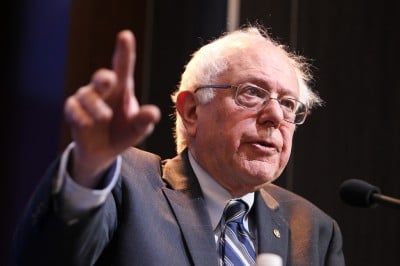America’s “Populist Spoiler”: Bernie Sanders as Contender, When the Ordinary Looks Extreme

He has thrown his hat into the ring as the populist spoiler. Senator Elizabeth Warren, who would have been the ideal anti-Hillary Clinton candidate, seems to lurk in the background as a threatening promise. “Financial institutions shouldn’t be allowed to cheat people,” she suggested to those attending the Institute for New Economic Thinking’s Finance & Society conference. “Can I have an amen on that?”[1] With all that about, it has fallen to Bernie Sanders to create a bit of a ruckus in the Democratic camp, a person who has shunned such tags as “progressive” or “liberal” in favour of “democratic socialist”.
In somewhat clumsy fashion, Charles W. Cooke attempted to heap some praise on the candidate who anticipates giving the Clinton campaign a few headaches. “Unlike the vast majority of American politicians, Sanders has not contrived to determine the most electable point on his part of the ideological spectrum and then to present its presuAmerica’s Populaist mptions as if they were his own, but has instead determined to present himself to the public as he actually is” (National Review Online, Apr 29).
Sanders has a considerable swathe of targets in the Hillary dossier, which is looking more pneumatic with each passing day of campaigning. There will be the free trade train which is chugging away to secrecy and non-consultation, a point Clinton is mor likely to celebrate than not. She is hardly in any mood to take on the moneyed classes, despite doffing the symbolic hat to America’s common voter. “Why don’t you tell me what Hillary Clinton is campaigning on?” Sanders demanded of an MSNBC host.
It takes the ostensibly corporate driven nature of US politics to make Sanders look screamingly radical. “What’s wrong with being more like Scandinavia?” is the sort of question that will make the militia run for their weaponry and the Tea Party mount the stump. For Sanders, democratic socialism is standard, and fairly mundane Scandinavian fare – one just needs to “know what democratic socialism is.”
Central here are the basics of social justice; and anything with social in the equation of American politics sits very uncomfortably with the Social Darwinian instinct. Crippling poverty and hunger exist in parallel worlds with Silicon Valley and the start-up mentality. Sanders noted the words of Michael Reisch of the University of Maryland in testimony before his Senate subcommittee on health and ageing in 2014. “Poverty is a thief. Poverty not only diminishes a person’s life chances, it steals years from one’s life.”[2]
In his own observations on the subject, Sanders has noted the astral disparities between life expectancy in regions of the United States, even localising their effects to neighbourhoods. But he does not reflect upon them as a sociologist shaded by Marxist sentiment. He, too, has an eye on the money cost to the country. Poverty, in other words, does not merely reduce life; it increases losses more broadly speaking. “If people don’t have access to health care, if they don’t have access to education, if they don’t have access to jobs and affordable housing then we end up paying not only in terms of human suffering and the shortening of life expectancy but in actual dollars.”
Then comes reference to the participatory element in a country that is ritualistically estranged from its political roots. A vote is necessary to the pantomime, but is generally irrelevant to shifting the political status quo. In contrast, “The voter turnout [in Denmark, Norway, Sweden] is a lot higher than it is in the United States.”[3]
Suggesting a Canadian-styled Medicare system is already going to send the anti-socialising forces into a spin even if it seems banal in most other cases. Other regulatory pushes, insinuating the state into responsible roles for public welfare will do the same. Sanders wishes to audit the Federal Reserve, a point he shares with Ron Paul, but oversight is the demon of the plunder’s mission.
None of this points makes Sanders a “socialist” at all. But that does not stop Forbes Magazine from suggesting, through Tim Worstall, that Sanders is “an avowed socialist” with a vital difference: the media will cover his exploits, give him coverage and some measure of exposure. “Rather than debating whatever the merits or not of the 3 degree differences between the Republican or Democratic position on anything we can proffer up truly radical policies.”[4]
We are not left with a banquet of options. Do you want Sanders, the unvarnished, direct sort of chap who is a sanitised faux radical, or the Nebuchadnezzar of the focus-group, the synthetic, hologram nightmare that is the Clinton factory? He has already raised $1.5 million on his first day of campaigning, and secured 175,000 pledge volunteers.[5]
US political society will prevent Sanders from getting to the White House, as will the Clinton machine, but that won’t stop him trying. Whether Sanders instils an element of sanity over such matters as a frayed safety net and equitable taxation may well receive a traditional rebuke. It is, after all, nigh impossible to succeed in a political race that avoids all references to change inspired by the left in favour of right-wing varieties and populist cameos.
Dr. Binoy Kampmark was a Commonwealth Scholar at Selwyn College, Cambridge. He lectures at RMIT University, Melbourne. Email: [email protected]

